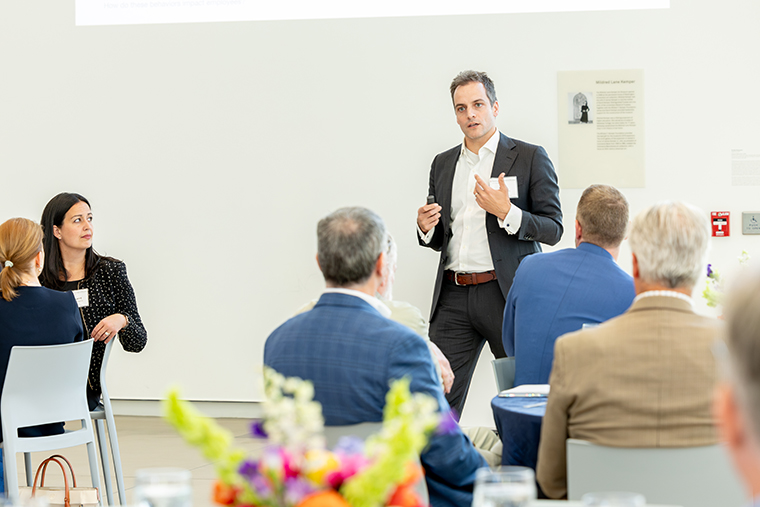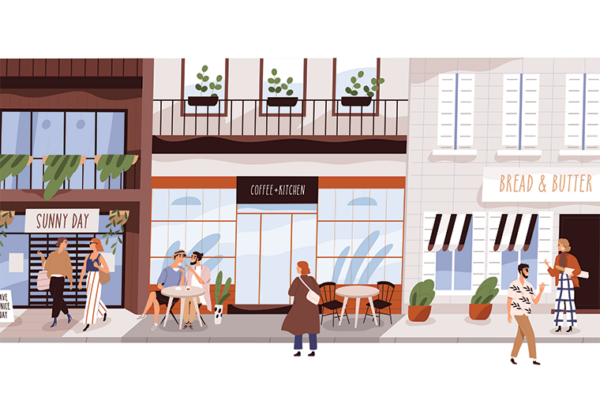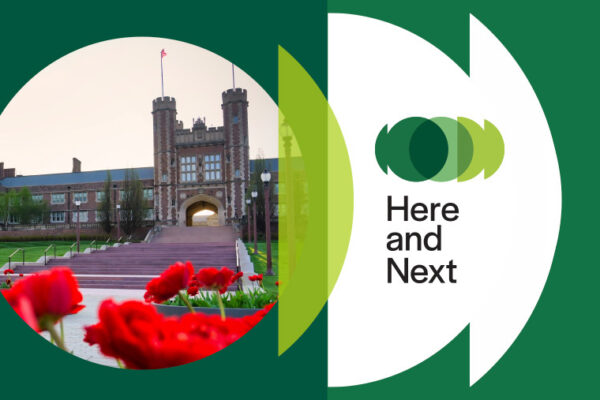A new program at the Olin Business School’s Koch Center for Family Enterprise is working with top philanthropists to help them increase the impact of their giving.
With initial funding from Washington University in St. Louis Chancellor Andrew D. Martin, PhilanthropyForward is a philanthropy incubator that brings 10 donors together for six months to learn how to create an individualized giving strategy that aligns with their values, community needs and data-backed strategies. They are currently recruiting fellows for the second cohort, which will begin in the fall.
“At Olin, we emphasize the importance of values-based, data-driven leadership. PhilanthropyForward aligns perfectly with that mission,” said Peter Boumgarden, Olin’s Koch Family Professor of Practice in Family Enterprise and director of the Koch Center for Family Enterprise.
“PhilanthropyForward is for significant donors who want to address a specific challenge with their giving and can make time for an intensive peer learning program. We give them the tools they need to turn their various interests into a cohesive giving strategy and measure the impact of their giving.”
The program includes a three-day fall immersion experience at WashU, a two-day off-site winter retreat, three months of individual virtual coaching and peer discussions, and personal time preparing individual five-year plans for their giving. Because the program’s content and guest speakers are customized to meet each fellow’s interest, no two cohort experiences will be the same.
“One of the unique aspects of PhilanthropyForward is that it is designed for donors themselves rather than philanthropy professionals that lead foundations. This creates a peer group of high-powered philanthropists who can learn from each other and even work together on shared interests,” said Margaret Schnuck Rogers, director of the PhilanthropyForward initiative.
Fellows in the first cohort included donors who make significant personal contributions to charitable causes; those who have or plan to start a donor-advised fund or foundation; executives who control their corporate foundation; and family members who have a decision-making role in their family foundation, such as Rachel Wallis Andreasson, Executive MBA ’12.
Wallis Andreasson is a board member and shareholder of Wallis Companies, a family-owned business that her father founded in 1968.
“I was honored to be asked to participate in WashU’s PhilanthropyForward program,” she said. “It was the perfect combination of learning and hands-on application that allowed me to set up our family foundation for the future. On top of that, it was a terrific environment to learn from the other participants, faculty and staff.”
According to Rogers, the program provides a bridge between donors who are looking for cutting-edge solutions and the WashU researchers finding them. Fellows gain a greater understanding of their identity and comparative advantage as philanthropists, as well as tools to measure and understand their impact and a stronger philanthropic network. By the end of the program, fellows will develop a five-year plan for their giving, including causes to support, potential partners and a plan to engage stakeholders.
Many individual philanthropists give only in a reactive way when someone makes a request rather than proactively. We help philanthropists create a balanced portfolio that includes a strategy that they can fund proactively, but still leaves room for responsive giving.
Susan Fitzpatrick, retired president of the James S. McDonnell Foundation
“Many individual philanthropists give only in a reactive way when someone makes a request rather than proactively,” said Susan Fitzpatrick, retired president of the James S. McDonnell Foundation, who lends her decades of experience in philanthropy to the program.
“We help philanthropists create a balanced portfolio that includes a strategy that they can fund proactively, but still leaves room for responsive giving. The former allows donors to keep an eye toward measurable impact. The latter is important for both familial and community well-being.
“On the other end of the spectrum, donors sometimes hold too tightly to a strategy that’s no longer working,” she added. “Our program helps donors consider the factors in their internal and external landscapes that might cause them to shift their strategy in the future, including changing interests of a growing family, new research or the political landscape.”
Tuition for the program is $10,000. View more information about the Koch Center for Family Enterprise and other executive education programs offered through the center.



